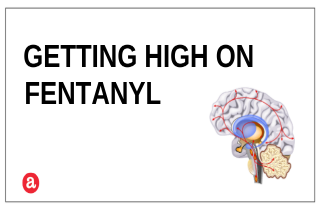What is Fentanyl?
Fentanyl is a strong opiate pain reliever that is similar to but much more potent than morphine. It is typically used as a post-surgical pain reliever, or in situations of severe pain.
However, Fentanyl is classified by the Drug Enforcement Agency (DEA) as a Schedule II drug, meaning it has some medicinal value but high abuse potential. Further, a synthetic version of this drug is now being produced in illicit drug labs – known as acetyl Fentanyl – has no approved medical use but is just as addictive. On the street, this drug has been called Apache, China girl, China white, dance fever, friend, goodfella, jackpot, murder 8, TNT, Tango, and Cash.
So, are people using Fentanyl to get high? How does it work in the brain? We review here. Then, we invite your questions or comments about the euphoric effect of Fentanyl at the end.
How Exactly Does Fentanyl Work?
Fentanyl, like other opiate pain-relievers, attaches itself (or “binds”) to the opiate receptors in the brain. These receptors are highly concentrated in the parts of the brain responsible for pain and emotion. The drug works by selectively binding to the mu-receptor in the central nervous system, thereby mimicking the effects of opiates that naturally occur in the body. The result is a change in the amount of neurotransmitters in the brain cells, especially of dopamine, thus producing a potent “high” feeling of euphoria.
However, it also has an effect on the parts of the brain responsible for some autonomic functions such as breathing. The main deadly mechanism of any opiate drug is the depression of respiration- essentially, an overdose can cause the user to stop breathing, which leads to brain damage and death if not reversed in time.
How is Fentanyl Used?
As mentioned, Fentanyl is a highly potent opiate painkiller. It is officially used for pain relief, to be prescribed by physicians. When prescribed, it is typically administered via injection, patch, dissolvable lozenge, or even in a “lollipop”. However, there is an increasing trend of illegal use and abuse of this drug.
Illegally produced Fentanyl tends to be in powdered form, and more often than not is mixed with heroin. Users trying to purchase heroin often unknowingly purchase a mix of the two, and wind up overdosing as a result. The patches are also frequently abused or used incorrectly, typically leading to a Fentanyl overdose or death.
What are the side effects of Fentanyl?
Main side effects of Fentanyl include:
- difficulty urinating
- drowsiness
- dry mouth
- intense euphoria
- lightheadedness
- respiratory difficulties
- severe constipation
- weakness and fatigue
Can Fentanyl Get You High?
Yes, Fentanyl can get you high.
In fact, Fentanyl can absolutely be abused and produce an intense but short-term high, similar to heroin or other opiate painkillers, but much, much stronger. Getting high on the drug is one of the main reasons for abuse that leads to addiction, and once addicted, individuals require structured Fentanyl addiction treatment programs and help to stay clean and sober on the long terms.
Another major danger is, Fentanyl is anywhere from 25-40 times more potent than heroin, so even “experienced” opiate users can easily overdose from Fentanyl, particularly when they aren’t aware of how much they are taking.
Despite the dangers, more and more opiate users are turning to heroin for a more intense or “better” high. However, the unpredictability of this drug in terms of potency and absorption rate makes it a serious risk for both overdose and death.
Fentanyl Danger on the Rise
Opiate overdoses either directly involving or including Fentanyl as a contributing factor are, alarmingly, on the rise. While most toxicology tests cannot differentiate between illicitly-produced Fentanyl and prescription Fentanyl, the CDC reported that between 2013 and 2014, deaths involving Fentanyl (or related opiates) increased by around 80%…and the numbers continue to rise. Law enforcement continues to observe increasing numbers of illicitly produced Fentanyl in reported seizures, which is likely contributing to the rash of deaths in recent years.
What to Do In Case of Fentanyl Overdose
Call 911 immediately.
Timing is critical, as any opiate overdose typically means breathing has stopped, and the longer you go without oxygen, the higher the chances of brain damage or death. Paramedics and police officers can administer life support, and should also be equipped with Narcan, medication which reverses the effects of opioid overdose (including sedation and respiratory depression).
Further, more and more civilians are being trained and equipped for administration of Narcan – you can contact your local department of health for more information on this training. Finally, even if Narcan is administered in time, this is only the first step.
Don’t Stop at Narcan
Drug overdoses are rarely isolated events. Substance abuse detox and treatment should be sought immediately to prevent continued use, and to decrease the likelihood of additional overdoses. When you are stuck in a cycle of prescription painkiller addiction, it can be difficult to imagine that life could be any different. However, people do recover from opiate addiction every day, and go on to live happy, productive lives.
Reach out, help is available.
Questions about Fentanyl
Do you still have questions about the euphoric effect, the high, or the risks of taking Fentanyl? Please leave us your questions in the comments section below. We’ll do our best to respond to you personally and promptly.









Related Posts